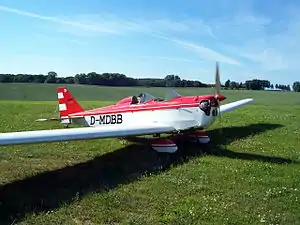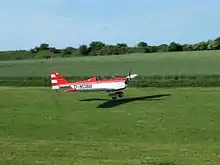Dallach Sunrise
The Dallach D.2 Sunrise, also known as the WDFL Sunrise after its suppliers, is a single-engine, single-seat cantilever monoplane. It was designed and marketed as a homebuilt aircraft in Germany by Wolfgang Dallach.
| Sunrise | |
|---|---|
 | |
| Role | One or two-seat sport kitbuilt ultralight |
| National origin | Germany |
| Manufacturer | WD Flugzeug Leichtbau |
| Designer | Wolfgang Dallach |
| First flight | 1986 |
| Produced | 5 years |
| Number built | c.39 |
Design and development
Wolfgang Dallach's Sunrise, marketed ready-to-fly or in kit form by his WD Flugzeug Leichtbau (WDFL), was his first ultralight design. In Germany, it was the first ultralight equipped with a four-stroke engine. The Sunrise is a tandem two-seater. Both seats are equipped with a throttle lever, rudder and control stick. Full engine control is available only from the rear seat. The fuselage is built from steel tubes and is fabric covered. The wing has a nose made of fiberglass. The main spar is built from CFK. The Sunrise has a fixed tailwheel undercarriage, with the mainwheels hinged from the fuselage on V-form, cross-connected struts. Some Sunrises have wheel fairings.[1]
The Sunrise can be powered by one of several engines in the 28-66 kW (38-90 hp) power range.[2]
Operational history

About 39 Sunrises are thought to have been built, all flying in Germany.[1] In mid-2010, 19 years after kit production ended, 38 still appeared on the German civil register.[3]
Variants
Data from DAec[2]
- Sunrise
- Original version, 28 kW (37.5 hp) Citroën KKHD four-stroke engine
- Sunrise IIA
- 47 kW (74.6 hp) Sauer UL 2100 two-stroke engine
- Sunrise IIB
- 66 kW (88.5 hp) BMW UL four-stroke engine
- Sunrise IIC
- 51 kW (68 hp) BMW R1000 four-stroke engine
- Sunrise (Verner)
- 59 kW (79 hp) Verner SVS 1400 engine
Specifications (Citroën KKHD engine)
Data from Airelife's World Aircraft[1]
General characteristics
- Capacity: one
- Length: 5.31 m (17 ft 5 in)
- Wingspan: 13.08 m (42 ft 11 in)
- Height: 1.42 m (4 ft 8 in)
- Max takeoff weight: 250 kg (551 lb)
- Powerplant: 1 × Citroën KKHD , 31 kW (42 hp)
- Propellers: 2-bladed
Performance
- Maximum speed: 149 km/h (93 mph, 80 kn)
- Cruise speed: 120 km/h (75 mph, 65 kn)
- Range: 255 km (158 mi, 138 nmi)
References
- Simpson, Rod (2001). Airlife's World Aircraft. Shrewsbury: Airlife Publishing Ltd. pp. 168–9. ISBN 1-84037-115-3.
- DAeC Luftsportgeräte-Büro. "Kennblatt Nr.: 61040 Ausgabe Nr.: 4 vom: 12.01.2004" (PDF). Retrieved 16 December 2011.
- Partington, Dave (2010). European registers handbook 2010. Air Britain (Historians) Ltd. ISBN 978-0-85130-425-0.
External links
| Wikimedia Commons has media related to Dallach Sunrise. |